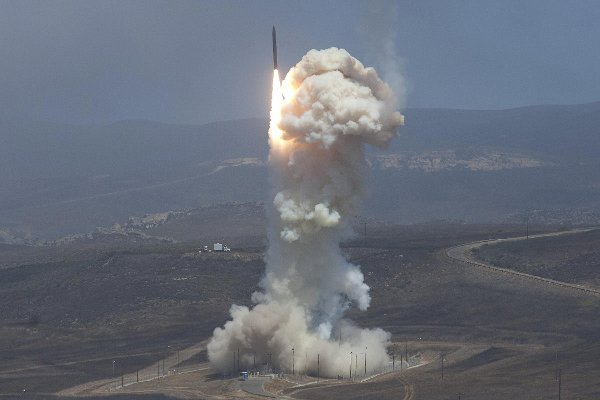
On Tuesday, the U.S. Missile Defense Agency announced it conducted a successful test of a system designed to shoot down intercontinental ballistic missiles. It’s the first test of the system by the U.S. in almost three years. The closely watched exercise came just a day after a North Korean missile test and weeks of a provocative uptick in such launches.
“Today was clearly good news,” said Republican Senator Dan Sullivan, who sits on the Armed Services Committee. “That was the first time that we’ve tested and then intercepted an ICBM type missile.”
Sullivan has been a vocal proponent of national missile defense. On May 22, he was part of a bipartisan group of senators to introduce a bill that would expand such systems through adding more interceptors, increasing testing and speeding up technical developments on the complex designs.
After a series of testing failures, a report from the Government Accountability Office in 2016 found that many of the Missile Defense Agency’s aims remained unfulfilled and the system had not demonstrated reliability. In spite of problems, Sullivan believes tests like Tuesday’s are a positive sign for the evolving technology.
“I wouldn’t say it’s proven, but it’s technology that has an enormous amount of promise. What my bill tries to do is accelerate this because the threat is accelerating,” Sullivan said in a phone interview a few hours after the test.
The military has spent tens of billions in tax-payer dollars on the ground-based missile defense system according to the GAO report. Critics say the technology say it not only has a poor performance record, but has faced major set-backs because of a flawed development process and is now largely obsolete. Tuesday’s test cost $244 million to conduct, according to the Associated Press and LA Times. Not every new test is likely to bear that price-tag, according to Sullivan, who sees even unsuccessful practice launches asinstructive.
“We need to make sure we have a culture that — as we advance — (says) it’s OK to fail, because we’re still learning,” Sullivan said.
The Ground-based Midcourse Defense system tested Tuesday includes four missile interceptors in California and 32 more at Fort Greely in Alaska’s Interior.
Zachariah Hughes reports on city & state politics, arts & culture, drugs, and military affairs in Anchorage and South Central Alaska.
@ZachHughesAK About Zachariah




